Farmington Historic Plantation
3033 Bardstown Road Louisville , KY 40205 United States
Get Directions
Completed in 1816, Farmington was the center of a 550 acre hemp plantation owned by the Speed family and sustained by nearly 60 slaves. The site explores the history of the family, the enslaved population, and the family's strong friendship with Abraham Lincoln . Tour the new Lincoln exhibits, the many outbuildings, and the recently restored historic home. Joshua Speed, son of John and Lucy Speed, befriended Abraham Lincoln while both young men were beginning their careers in Springfield, Ill., by offering him lodging. The two became close friends, and in 1841 Lincoln spent about three weeks at Farmington during a break in his relationship with Mary Todd. Joshua's brother, James, became Lincoln's Attorney General in his second administration.

Featured Content
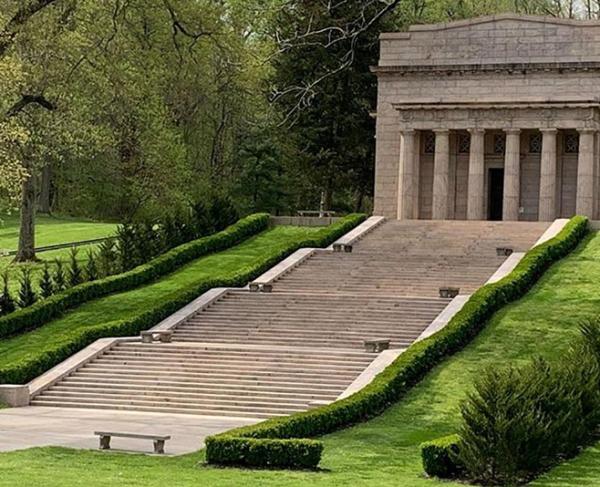
Abraham Lincoln Birthplace National Historical Park
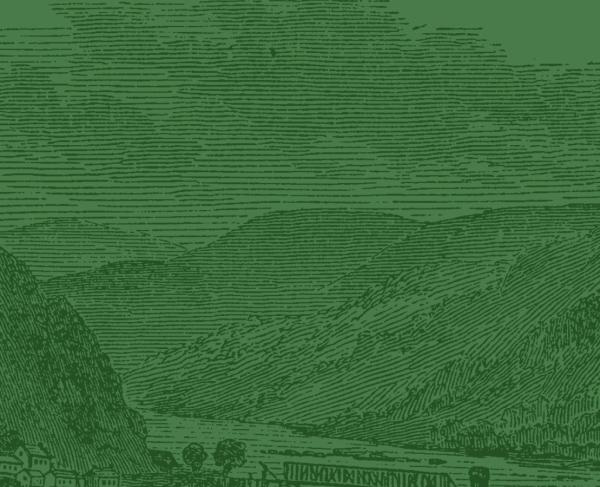
Hart County Historical Society Museum
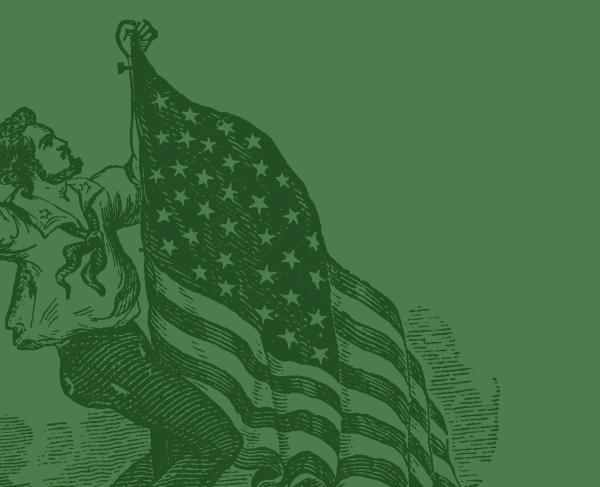
Jefferson Davis Memorial Historic Site
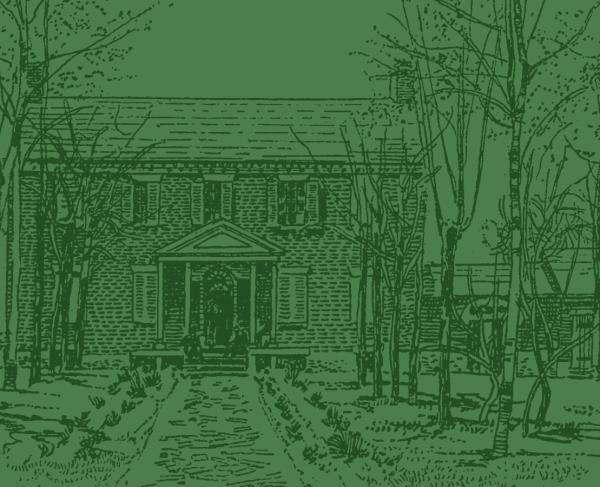
White Hall State Historic House
Farmington historic plantation: what's nearby.
Civil War | Historic Site Farmington Historic Plantation Louisville, KY
Civil War | Cemetery Cave Hill Cemetery and Arboretum Louisville, KY
Civil War | Cemetery Pewee Valley Confederate Cemetery and Monument Pewee Valley, KY
Civil War | Fort Fort Duffield Park and Historic Site West Point, KY
Civil War | Battlefield Corydon Corydon, IN
Civil War | Self-Guided Tour General John Hunt Morgan's Brandenburg Raid Brandenburg, KY
Civil War | Museum Spalding Hall Bardstown, KY
Farmington Historic Home
Life on a kentucky plantation.
No house in Kentucky more gracefully embodies Federal architecture than Farmington. Striking Jeffersonian features of its perfectly proportioned 14 rooms include two octagonal rooms, the adventurously steep and narrow “hidden” stairway, and the fanlights between the front and rear halls. Exquisite reeded doorways, carved mantels, and marbleized baseboards add special elegance to the interior. Most of the structure, including the woodwork, glass and brass, in original and still in excellent condition.
The present 18-acre site also includes an elaborate early 19th century garden, stone springhouse and barn, cook’s quarters and kitchen, blacksmith shop, museum store, and remodeled carriage house which may be rented for special events.
Leave a Reply Cancel reply
You must be logged in to post a comment.

“Come to Farmington…”
Joshua Speed to Abraham Lincoln, 1840
Take a Tour of Farmington
Farmington offers docent-guided tours of the 1816 main house Tuesday through Saturdays.
Walk-ins are welcome but tours can also be booked online to ensure a reservation. Please check our online booking calendar for tour availability.
Farmington is available for pre-scheduled group tours on any day of the week. Special rates are available for groups of 15 or more people scheduled in advance. Call 502-452-9920 or email [email protected] to schedule a group tour.
Adults – $15 Seniors (60+) $12 Students (6-any age) $8 5 & Under – Free
Visitor Center Audio Tour
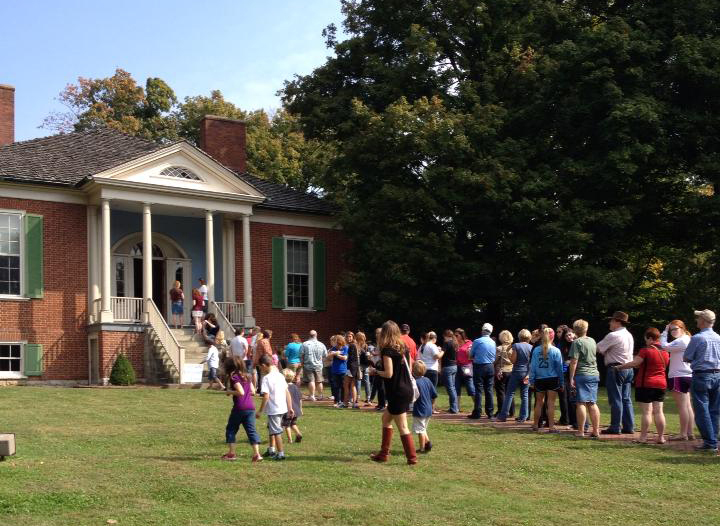
Review Highlights

“ Abraham Lincoln once stayed here and it is believed that it was his first visit to a slave plantation. ” in 4 reviews

“ I am a direct descendent of David and Martha Spencer , the patriarch and matriarch of a family of enslaved black people on this farm. ” in 2 reviews

“ The paint colors and wallpaper are the actual colors and designs as they were during the Speed family 's residency. ” in 2 reviews
Location & Hours
Suggest an edit
3033 Bardstown Rd
Louisville, KY 40205
You Might Also Consider

Kentucky Derby Museum
5.6 miles away from Farmington Historic Plantation
Kentucky Derby Museum, where every day is Derby day! Kentucky Derby Museum, a 501(c)(3) non-profit organization in Louisville, Kentucky has a commitment to engage, educate, and excite everyone about the extraordinary experience that… read more
in Museums, Walking Tours

KMAC Contemporary Art Museum
5.9 miles away from Farmington Historic Plantation
KMAC Contemporary Art Museum is Louisville's premier educational contemporary art museum. Located in downtown on historic Museum Row, the Museum explores the relationship between art and craft by identifying art as the big idea and… read more
in Art Museums

Roots 101 African American Museum
5.4 miles away from Farmington Historic Plantation
Leah J. said "This place was everything and more. My companion and I drove from Indianapolis to tour the museum and we are so glad that we did. I called and spoke to Kenny he was very knowledgeable and helpful. When we walked in he gave me us an…" read more
in Art Museums, Venues & Event Spaces
Amenities and More
About the business.
Louisville's first historic house museum interprets the lives of the John Speed family and the over 60 enslaved black Americans that farmed the 550-acre hemp plantation visited by Abraham Lincoln in 1841. …
Ask the Community
Ask a question
Yelp users haven’t asked any questions yet about Farmington Historic Plantation .
Recommended Reviews
- 1 star rating Not good
- 2 star rating Could’ve been better
- 3 star rating OK
- 4 star rating Good
- 5 star rating Great
Select your rating
Overall rating
What a great place to visit. Get an informative tour and history of a Kentucky plantation. The octagon-shaped home is interesting to see and Abe Lincoln's association with the Speed family is something I did not know. Worth your time to drop in for a visit.
The history of this game is incredible, fascinating links to Abraham Lincoln (and other US leaders)thay reach far beyine the walls for this beautiful home. Our tour guide John was knowledgeable, funny, insightful and most of all honest. He was able to let us know how they can prove certain facts, what they had to assume based on what they know and did not shy away from delicate subjects yet handled them with honesty and sensitivity. I highly recommend this tour and our tour guide John!

Thank you John for taking care of my sister and I on our tour to the plantation! We truly enjoyed and appreciated your in-depth history of the site. Thank you for sharing your knowledge and giving us a great memory of Louisville!

We love it here. We often come on a walk to see the crops, garden, and foliage change through the seasons.

Being at Farmington is both sobering but also very inspirational. The last time that I visited Farmington was during a family reunion in 2005 or 2006. I am a direct descendent of David and Martha Spencer, the patriarch and matriarch of a family of enslaved black people on this farm. They are my great-great-great grandparents. I know who begat who and therefore, who begat me. I am fortunate that I know that part of my lineage. My ancestors toiled the land but did not reap the fruits of their labor. That is where their story began, but, not where it ended. After being freed from the bondage of slavery, my ancestors went forth and created a life and a legacy right in Louisville, Kentucky and beyond! I am proud of their strength, perseverance, love, and dedication to family. This beautiful place is a testament to how far we have come as Americans and we have come far. It is also a reminder that the fight for equality, freedom, justice, and democracy for ALL is a battle that continues to be waged and a battle, together, will be won.
Hands down one of the most influential and moving experiences of my life. Highly recommended for adults even more than kids
I can not recommend this event enough! We did not know what to expect walking thru the doors of Farmington, but we were not disappointed in the slightest bit. Everyone was very welcoming and friendly. The employees genuinely care about teaching the community about the history of the plantation. You are free to ask any questions, about the history of the land! If anyone is looking for a perspective-altering afternoon, check out Farmington! If I could give this place 6/5 stars, I would!

I honestly do not know how to rate this because my ancestors used to live on this plantation. I am happy that my family actually knows where our ancestors lived. It was very hard to go to that plantation knowing how slaves were treated, They paved the way for us to become great people. My Grandmother was recognized by Farmington in 2002 because she gave them pictures and information about David and Martha Spencer which was her great grandparents who lived there. Farmington recognized my Grandmother when she passed away in February. They even came to her funeral and gave a nice speech about her. I wanted to do a tour but we arrived to late for the tour so we just walked around.

See all photos from Leslie B. for Farmington Historic Plantation

A beautiful day today, 60 degrees, where to go, what to do. The two bourbon distilleries we selected are both closed on Tuesdays. Locust Grove..closed for the month of January. Farmington Historic Home is closeby on Bardstown Road and we have never been there. FHH it is!! We arrived at 1:45 in time for the 2 pm tour. Tours are scheduled on the hour with the last tour offered at 3pm. $10 per person, $8 for seniors and Triple A. A bonus today was that we were the only two people on the tour. Our docent was a lovely woman (I forgot her name) who clearly loved her volunteer job and meeting guests from all over the country. The first stop before moving into the actual home was a tribute garden in memory of the slaves that were owned by the Speeds and lived and worked the Plantation....once a flourishing hemp farm. The home has been lovingly restored and contains actual possessions of the Speed family as well as being supplemented by other furniture of the era. The paint colors and wallpaper are the actual colors and designs as they were during the Speed family's residency. The house was built by slaves from 1815-1816. Much of the history that the docent delivered had to do with the three weeks Abraham Lincoln stayed at the home as the guest of his good friend Joshua Speed. The grounds are available to walk at no cost and provide an opportunity to see the gardens, spring house, smoke house,etc. Additionally, a multi media production is available in the visitors center which provides an overview of the Speeds, their lives, their slaves, Lincoln's connection to the family, and the hemp business during that time. Do make a trip to Farmington right on Bardstown Road. Local history!!

See all photos from Alison R. for Farmington Historic Plantation

Interesting place. Only a shame that Covid had it closed so we only saw it from the outside. Now only a small shadow of the size that it used to be, though, from the information we saw there.
1 other review that is not currently recommended

Harley’s Creative Studio
Artists, designers, sculptors, painters, and graphic designers, networking and collaborating, making magic with you, for you, anything you can imagine, or any ideas brought to life! If it's creative, we can create it! read more
in Art Consultants, Art Galleries, Art Restoration

Locust Grove Historic Site
4.8 miles away from Farmington Historic Plantation
Locust Grove is conveniently located minutes from Downtown Louisville and offers elegant indoor and outdoor spaces capable of accommodating receptions, ceremonies and events of all sizes. In addition to free on-site parking, chairs,… read more
in Museums, Parks, Venues & Event Spaces
Collections Including Farmington Historic Plantation

State🌲Parks
By Elise Dixie Jane M.
People Also Viewed

Howard Steamboat Museum

Louisville Water Tower Park

Filson Historical Society

Conrad/Caldwell House Museum

Frazier History Museum

Thomas Edison House

Vintage Fire Museum and Safety Education Center
Best of Louisville
Things to do in Louisville
Other Museums Nearby
Find more Museums near Farmington Historic Plantation
People found Farmington Historic Plantation by searching for…
Black Acre Park Louisville
Farmington Historic Home Louisville
Historical Home Louisville
Plantation Tours Louisville
Tourist Attractions Louisville
Historical Sites in Louisville
Browse Nearby
Things to Do
Restaurants
Arts & Entertainment
Bike Rentals
Car Museum Near Me
Museums Near Me

Farmington Historic Plantation
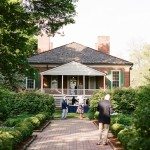
3033 Bardstown Rd. Louisville, KY 40280
- Bourbon Experience
- Arts & Entertainment
- History & Culture
- Spas & Wellness
- Daily Tours & Exhibits
- Restaurant Listings
- Top Restaurants
- Top Breakfast & Brunch Spots
- Lou's Brews
- Regional Foods
- Urban Bourbon Trail
- Coffee & Tea Shops
- Vegan & Vegetarian Restaurants
- Hotels & Motels
- Bed & Breakfasts
- Short Term Rentals
- Book a Room
- Annual Festivals & Events
- Butchertown
- Clifton & Crescent Hill
- East Louisville
- The Highlands
- Old Louisville
- Shelby Park & Smoketown
- South Louisville
- Southern Indiana
- West Louisville
- Visitor Guide
- Newsletter Signup
- Visitor Center
- Louisville Transportation
- Weather & What to Pack
- Relocating?
- Online Reservations
- Destination Services
- Sports Events
- Group Travel Planning Toolkit
- International Travel
- Travel Advisors
- Contact Tourism Development
- Get Involved
- Stay in Touch
- Rose Awards
- Partner Login
- Media Requests
- Story Ideas
- Development Projects
- Filming in Louisville
- Marketing Plan
- Diversity & Inclusion
- Destination Strategic Plan
- Research & Publications
- Volunteer Opportunities
- Privacy Policy
Loading your recommendations…
- Calendar Of Events
- Where to Stay
- Attraction Tickets
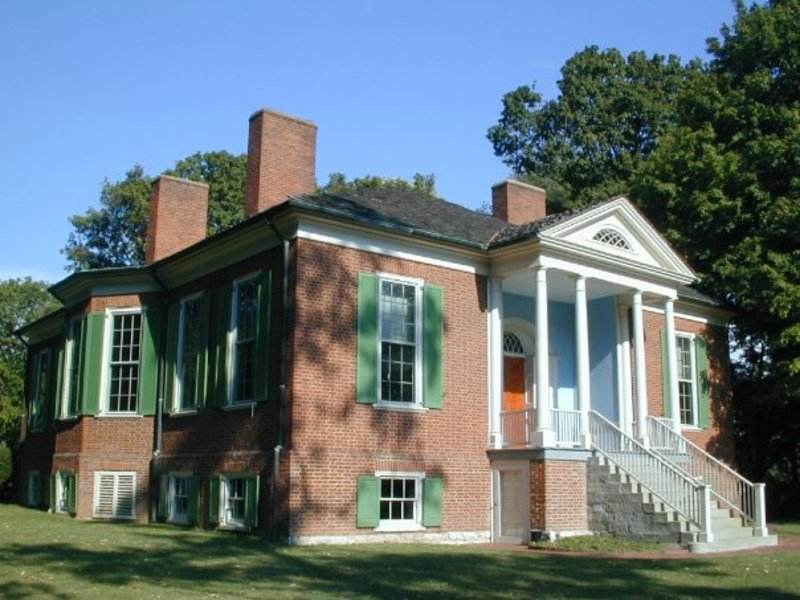
Farmington Historic Plantation
3033 Bardstown Rd. Louisville, KY 40205
Phone: (502) 452-9920 Fax: (502) 456-1976
- Capacity: 2
- Total Square Footage: 4800
301 South 4th Street Louisville, Kentucky 40202
1.888.LOUISVILLE (1.888.568.4784)
Farmington Historic Home in Louisville
July 31, 2023
By Kathy Nichols, Executive Director, Farmington
In the mid-1950s, a group of influential Louisvillians created Historic Homes Foundation (HHF), inspired by landscape architect Anne Bruce Haldeman and headed by publisher Barry Bingham Sr., to purchase and restore the old Speed house, Farmington, and open it as a “public shrine.” On April 28, 1959, Farmington Historic Home opened as the first house museum in Jefferson County and quickly became one of the most visited historic sites in the Commonwealth.
HHF founders knew Farmington had been a thriving hemp plantation carved out of the Kentucky wilderness. It was home to John and Lucy Gilmer Fry Speed’s family. Construction of the Speeds’ brick residence, an outstanding example of Federal-style architecture, began at Farmington in 1815. The house, identified in the original building contract as the design of Paul Skidmore, was an unusual and ambitious plan clearly influenced by the architectural designs of Thomas Jefferson.
Although a few appurtenant buildings still stand—including a spring house and a barn—none of the cabins that housed enslaved people remained on the 18 acres HHF eventually acquired, yet we know that enslaved Black people almost certainly had a big hand in building Farmington. At the time of John Speed’s death, at least 70 enslaved Black people performed the physical labor required on the plantation.
John Speed (1772-1840) and Lucy Gilmer Fry Speed (1788-1874) came from wealthy families who moved to Kentucky County, Virginia, before 1790. Their fathers, like many wealthy Revolutionary War heroes, sought to make fortunes in land speculation in the newly opened territory west of the Appalachian Mountains. Immigrating at separate times, the Speed and Fry families and their enslaved people traveled over the Wilderness Road and settled near Danville.
After John’s first wife, Abigail LeMaster Speed (1768-1807) died, he took their daughters, Mary and Eliza, back to Mercer County. In November 1808, he married Lucy Gilmer Fry and returned with his new wife and family to the land that would become Farmington. The 554-acre tract was carved from celebrated Jefferson County “Beargrass Preserve” lands that Speed purchased with partners. An August 1809 letter from Speed to his partner, William Pope Jr., reports that “we are now living in our cabins.” Farmington was 6 miles from Louisville in the Kentucky wilderness being turned into crop lands by settlers. Enslaved men immediately began building cabins, cutting the woods, and clearing vast sections into fields for planting corn and hemp.
Women planted kitchen gardens, tended poultry, cattle and hogs for food and provisions. Wild game was common. One day, Lucy Speed took a walk to the spring with her baby and was chased back to the cabins by a bison!
In addition to Mary and Eliza, John and Lucy had 11 children, nine of whom survived to adulthood. Farmington was a busy place over the years, with 13 Speed children—seven girls and six boys—in residence at various times. All the Speed children, male and female, were well educated. Research indicates several children attended schools away from Farmington.
Music, an important form of entertainment at Farmington, was taught by Anton Heinrich, a Bohemian composer and violinist who lived with the Speed family for a year and a half beginning in 1819, teaching Mary and Eliza to play pianoforte, to compose and to give concerts. Both Speed daughters became accomplished pianists, and Mary inherited her father’s pianoforte.
Strong connections and family ties existed among the enslaved families at Farmington. Morocco, much favored and written about, and his sister Phyllis were likely a wedding gift from Lucy’s father, Joshua Fry. Phyllis and Morocco’s sister Jinnie was enslaved at nearby Oxmoor Plantation, owned by the husband of Mildred Ann Fry Bullitt, Lucy’s sister. When she was born, Phyllis’ daughter Diana was given to Mary Speed, and she remained with Mary, who never married, into the 1860s, when Diana, her daughter Dinnie, and son Henry successfully freed themselves and lived in Indianapolis until “after the war.” Today, the descendants of David and Martha Spencer and of Abram and Rosanna Hayes have generously shared family research and oral traditions to help inform our interpretation. Ongoing research continues to identify and connect people who were enslaved at Farmington.
Hemp, a bast fiber, was grown by Kentucky farmers to make twine and rough bags for the Southern cotton market. Production of hemp necessitated a large labor force and ensured that Kentucky would be a slave state. Slavery was an integral part of life during the Speed family’s 50-plus years on the property. Enslaved men and women worked in the house and its dependencies as agricultural field laborers and in “manufacturing” at a ropewalk and weaving house where the Speeds’ hemp was processed on the plantation, according to references from John Speed’s 1840 probate inventory.
Archaeology has uncovered several foundations near the present non-historic “carriage house,” including one that is likely the log house occupied by the Speed family during their first years on the property. This probably became a cabin for the enslaved in later years. Unfortunately, little is known about housing for the enslaved at Farmington. A reproduction outdoor kitchen, built on the footprint of the original in 1992, helps interpret the lives of people enslaved at Farmington.
Farmington’s best-known guest, Abraham Lincoln, came to Farmington in 1841. Joshua Speed and Lincoln developed a close friendship while roommates for four years in Springfield, Illinois. In late 1840, Lincoln broke his engagement to Mary Todd and fell into a deep depression.
Joshua, heading to Farmington after the death of his father, John, invited Lincoln to visit him. Lincoln arrived at the Louisville wharf in August. At Farmington, the young lawyer gained new perspectives through immersion in a lifestyle foreign to his previous experience. It is the only time the future president lived an extended period, approximately three weeks, fully immersed in the culture of the Southern planter elite. Lincoln’s Sept. 27, 1841, letter to Mary Speed shows the friendly, affectionate relationship that existed between Lincoln and his host’s family. Lucy Speed seems to have taken a special interest in her son’s friend. As a token of affection, she gave Lincoln an Oxford bible. Years later, President Lincoln sent an autographed photograph to Lucy referencing the gift. The Speed children all supported the Union during the Civil War, and Joshua and brother James served as unofficial advisers to the president. In 1863, Lincoln appointed James attorney general of the United States.
Lincoln’s letter to Mary Speed contains his earliest known personal comment on the enslaved. When he and Joshua boarded the steamboat Lebanon to return to Springfield, he saw men being taken for sale “… strung together precisely like so many fish upon a trot-line.” Years later he said, “… that site was a continued torment to me …” Joshua later claimed that seeing the slaves on board that ship helped focus Lincoln’s emancipationist sentiment.
Today, guided tours of Farmington’s main house and free, self-guided grounds tours explain the history of the plantation and the roles of the support structures on the property. The Farmington Board of Regents recently completed a strategic planning initiative with nonprofit consultant Ashley|Rountree that will help the site restore and care for structures as we continue important research into the people who lived at Farmington.
Farmington is growing hemp again and will feature a Hemp Dinner on Oct. 28, 2023. Whether you have an hour or an afternoon, we hope you will visit, take a tour and hear Farmington’s stories.
3033 Bardstown Road
502.452.9920
VisitFarmington.org
Vested Interest Publications, Inc. | P.O. Box 559, Frankfort KY 40601 | 888.329.0053
Louisville’s Historic Architecture
A collection of Louisville’s architectural and cultural heritage treasures, to inform and educate anyone wanting to appreciate our surviving built history.

ATTRACTIONS


NEIGHBORHOODS
Architecture.
Every visitor should experience at least one visit to a historic site. Every Louisvillian can have knowledge about our traditional neighborhoods. Every student can have a basic architectural vocabulary.
NEWEST ENTRIES

ADVERTISMENT
Note: This website is provided for entertainment purposes only, it does not cite sources or offer annotations, any material may be challenged or altered at anytime.
- Things to Do
- Restaurants
- Vacation Rentals
- Travel Stories
- Rental Cars
- Add a Place
- Travel Forum
- Travelers' Choice
- Help Center
Plantation Tours - Farmington Historic Plantation
- United States
- Kentucky (KY)
- Louisville
- Louisville - Things to Do
- Farmington Historic Plantation
My husband and I were the only ones there so we received a private tour. It was so interesting to... read more
Excellent tour of this amazing historic home and property! Our tour guide (John) was very... read more
Plantation Tours
It was a really interesting sight to be able to stand there and be on a plantation. they also have signs with information for you to read about in case you cant make the tour times. It was interesting to read about how Abe Lincoln was related to the property.
This plantation is a hidden gem! Don't be fooled by the close proximity to a busy Louisville thoroughfare.The plantation had me at its long, tree lined, winding drive way. We visited on a winter day but I can only imagine the driveway during the spring or fall. We were introduced to the grounds by John, our very knowledge guide, who made the plantation come alive by his stories of the family members and of the slaves that lived and worked on the site. The approach from the visitor center to main house paints an impressive picture of wealth and land ownership. The house will definitely take you back in time with its period authentic and original furnishings. The grounds and information about the former outbuildings lends to the enjoyment of the tour. A site worth seeing!
The visitors centre is a short walk from the house and has an interesting small museum that positions the house and inhabitants in history. The guides are friendly and knowledgeable, and the house is a fascinating glimpse into the early 1800s. From historical documents (plans, letters and inventories) and from research at similar properties, the house is presented as it would have appeared around 1830. The plantation's main crop was Flax, and the display of the many products that were made from the crop is really interesting. No doubt people made a lot of money from the land; but in the inventory of one owner the bulk of his wealth, around 75%, was in the value of the slaves!
An unexpected stop in our trip was so worth it! Rich in history. The tour guide very knowledgeable. Recommend for anyone in the area to check it out!!
My friends and I found this while we were in Kentucky, we went to check it out. So glad we did, it was beautiful, and we learned some history we didn't know. We enjoyed talking to our tour guide. So worth the $9.00. ❤

This was an experience everyone will cherish. The wedding was held outside in an open garden and the reception was in a very large open sir building. Plenty of room for dancing and the north side is where all the food was catered. The children had a large area to run and play. I wish there was enough time tour the plantation home and see all the beautiful flowers and plants. What made the evening so beautiful was the full moon during the reception. If you like history, the Farmington Historic Home is a tour to do.
Edison, Lewis & Clark and more: 9 historic homes to explore around the Louisville area
Louisville is full of history, and there's no shortage of places to explore it around the city. From a 25,000-square-foot Richardsonian Romanesque mansion to the home of George Rogers Clark, who founded Louisville in 1778, to the largest residential library in Kentucky, containing more than 10,000 books, there's something for everyone to explore.
Here's a list of nine noteworthy historic homes that are located around the Louisville area.
Conrad Caldwell House
1402 St. James Court, Louisville; conrad-caldwell.org ; 502-636-5023
Tours: Wednesday, Friday, Saturday and Sunday at noon, 1, 2 and 3 p.m. Wednesday tours are self-guided. Friday, Saturday & Sunday tours are led by museum docents. Cost: Adults, $10, Seniors, $8, Students, $6; self-guided tour on Wednesday, $5.
This seven-bedroom mansion in Louisville's historic St. James Court has been converted into a museum. The Richardsonian Romanesque mansion has also been used as headquarters for the famed annual St. James Court Art Show.
“It was originally (constructed) on the site of the Southern Exposition, which encompassed (the) whole block,” Conrad-Caldwell House Museum executive director Kate Meador previously told The Courier Journal. When the Southern Exposition came to an end, pieces of the land were sold off.
“Theophile Conrad bought four lots right here at the corner of Magnolia and St. James, which was the ‘crème-de-la-crème’ place to live,” Meador said.
A French immigrant, Conrad built his 10,000-square-foot Richardsonian Romanesque castle-like mansion as a sort of homage to his homeland, Meador said.
Home of the Week: See inside this massive 25,000-square-foot Richardsonian Romanesque Old Louisville mansion
“He spared no expense,” she added. “He had seven different types of wood that he featured throughout the house; each room has a predominant type of wood. All the parquet floors are original, (and) he had two forms of heat — both gas and electricity. He had a boiler system and fireplaces, which was not typical (at that time).
"He wanted to leave this as an ornament to the city. So, this really was his sort of tribute to the city of Louisville.”
Farmington Plantation
3033 Bardstown Road, farmingtonhistoricplantation.org ; 502-452-9920
Tours: Farmington is open daily for self-guided tours of the historic property from 9 a.m. to 6 p.m. Guided tours of the house museum are available: Tuesday-Friday at 10 and 11 a.m., 12 1, 2, and 3 p.m. and Saturday at 11 a.m. and 12 and 1 p.m. Cost: Adults, $10, Seniors, $9, Children and students, $5.
This Federal-style brick home was once a lucrative hemp plantation after being built in 1816 and was restored to its original condition in the early 2000s. A bronze monument was added to the property during its renovations to honor the enslaved African Americans who built the home and once worked on the property.
“John Speed and his business partners bought several thousand acres here,” Farmington Historic Plantation executive director Kathy Nichols previously told the Courier Journal. “In the early 19th century, (he) took 554 acres and created Farmington.”
The land became a hemp plantation, as the plant was Kentucky’s number one cash crop at the time. “It’s what gave the commonwealth economic clout in the 19th century,” Nichols said. “It’s what ensured slavery would be secure in the commonwealth.”
The house on the plantation, she added, was most likely built by the enslaved.
“They did all the manual labor,” she said. “Enslaved men likely dug the clay for the bricks of that house. We can’t prove that yet, but on most Kentucky plantations, bricks were dug from the clay by enslaved men, put in the brick molds and then laid in the house by enslaved men. You can’t get more important to a place than that.”
Nichols estimates that as many as 70 people lived on Farmington at any given time, but it’s impossible to know the total number who came and went over the years.
“We can document them here in 1809,” she said. “(John Speed) writes a letter to David Ward that says, ‘We’re in the property, we’re in our cabins, we have only enough bacon to last until Ned returns.’”
Home of the Week: Farmington Plantation is an integral part of Louisville's biracial history
Ned, she said, was an enslaved man that had been sent to take the letter to town and bring back provisions for the people at Farmington.
“They lived here as early as then. [The enslaved] started construction of this house in 1815 and completed in 1816," she added.
Nichols also noted that in today’s climate, Farmington has much to offer.
“If you would like to know about the history of Kentucky,” she said, “it’s a biracial history. Come to plantations like Farmington, who are telling the story, who are saying the names. Let us tell you about … Diana and Dinnie, and all the people who lived here. Their stories deserve to be told — they built the commonwealth.”
Howard Steamboat Museum
1101 E Market St., Jeffersonville, Indiana; howardsteamboatmuseum.org ; 812-283-3728
Tours: Tuesday-Saturday, 10 a.m. to 3 p.m., Sunday 1-3 p.m. Closed Mondays. Last self-guided tour at 3 p.m., last guided tour at 2:30 p.m. Cost: Adults: $10, Seniors (65+): $8, Students age 6 through college: $6, Children under 6 with an adult: Free
This Jeffersonville gem sits along the Ohio River and offers an interesting look for visitors at the history of steamboats, which were critical to development in Louisville's early days.
Long before bridges connected Jeffersonville and Louisville, steamboats played a key role in the local economy, and Howard Steamboat Museum education assistant Kadie Engstrom is determined to preserve its history and teach people — both locals and visitors alike — about the Howard family.
James Howard founded the family shipyard in 1834, Engstrom said. When he passed away, his son Edmonds took over, and it was Edmonds and his wife, Laura, who built the gargantuan Richardsonian Romanesque Victorian mansion in Jeffersonville right on the Ohio River.
In addition to intricate woodwork and a one-of-a-kind staircase, Edmond and Laura’s house also had something that no other Jeffersonville home did at the time: electricity.
“They built a generator on the shipyard property,” Engstrom said. “They simply ran a wire across the street and electrified their own house. This house was the very first lighted house in Jeffersonville, and … the only lighted house in [the city] for some time.”
The Howards hired someone to shovel coal into a boiler steam system — under pressure, the steam created energy, and they were then able to illuminate several lights in the house. Engstrom said Laura planned for the house to be electrified, and she had purchased several appropriate lighting fixtures.
Home of the Week: Massive Victorian mansion built in the late 1800s on the Ohio River is a design phenomenon
“This is a great example,” she said, referring to the chandelier in front of the staircase. “[Laura] bought this chandelier out of a catalog. … The round balls, little and big, were all electric light in 1893, just like you see them today. The white things that look like bowls that are pointing upward are illuminating gas jets — today, we'd call that natural gas.
"[Using the gas cock], you can turn on one light at a time and have artificial light by gas; or you can turn out all the lights at one time and literally have as little or as much light as you want to," she said. "[It’s] a very efficient system.”
Locust Grove
561 Blankenbaker Lane, Louisville, locustgrove.org , 502-897-9845
Tours: The Locust Grove Museum Store and Gallery is open Tuesday–Saturday from 10 a.m. to 4:30 p.m. Docent-Led House Tours are Thursday-Saturday at 11 a.m., 12:30 and 2 p.m. Self-Guided House Tours are Thursday-Saturday between 10 and 11 a.m., and 3-4 p.m. Cost: Adults, $12, Seniors $10, Children 6-18 years, $6. Gallery only for adults, $6, Children, $3
It doesn't get much more historic than Locust Grove. This brick mansion on Blankenbaker Lane near the Ohio River now showcases life in the 1700s and 1800s and once served as the final home of George Rogers Clark, who founded Louisville in 1778.
Locust Grove was built in 1792 and owned by William Croghan, a surveyor who conducted his business from the home. Croghan’s wife, Lucy Clark Croghan, was the sister of Lieutenant William Clark — one half of the Lewis and Clark Expedition — as well as George Rogers Clark, who founded Louisville in 1778.
“A lot of different (pieces) of American history come together in this space,” said marketing and communications director Hannah Zimmerman said, adding that in addition to being a surveyor, William Croghan was a landowner and enslaver. Over the course of his time at the property, about 70 enslaved workers were at Locust Grove.
“William Croghan’s livelihood was made possible through enslaved labor,” Zimmerman said, pointing out the verdigris — a bright, bluish-green paint color used throughout the home, one of the most expensive paints of the period. “He may have bought the verdigris paint, but it was possible for him to do so because of enslaved labor.”
And Locust Grove is committed to telling the stories and interpreting the lives of the enslaved men, women, and children who lived and worked at the expansive estate.
Home of the Week: Step inside the expansive, historic Locust Grove, the final home of Louisville's founder
"Locust Grove was the home and workplace of dozens of enslaved African Americans during the Croghans’ residency from 1790 to 1849," according to its website. "At the peak of the farm’s operations in 1820, more than 40 enslaved people labored here. ... In 1849, the 22 enslaved individuals remaining at Locust Grove were emancipated by the will of Dr. John Croghan."
Though historians don't know what happened to many people after they left the property, the museum is "committed" to researching and sharing the stories of those enslaved at Locust Grove.
Oxmoor Farm
720 Oxmoor Ave., oxmoorfarm.org , 502-426-2126
Tours: By reservation only. Tours are offered on the first Thursday of the month at 10 a.m. or 2 p.m. and select Saturdays. Cost: Adults, $8, Seniors, $6, Children (ages 6-14), $5 and Children (ages 5 and under), Free.
Originally built by Alexander Scott and Priscilla Christian Bullitt, the home at Oxmoor Farm looks nothing like it did back when it was constructed in 1791. Since then, the massive nine-bedroom structure has housed five generations of Bullitts and been expanded upon to include a Federal-style central brick section, a kitchen wing, a breakfast room, and a second-floor addition, as well as a grand library wing.
Even the second generation of Bullitts wouldn’t recognize the house as it is today, says Oxmoor Farm Curator Shirley Harmon.
“(William and Mildred Bullitt) would recognize all the outbuildings, because they built those,” she said. “We have 13 outbuildings that predate the Civil War; all of those were built in their tenure. … But they would not recognize the sprawling estate that (exists) now.”
As Harmon explains, the original, 1700s part of the house is Virginia colonial architecture.
“(It’s) much like if you've ever been to Colonial Williamsburg,” she said. “A lot of those houses in the core of Mount Vernon are built in this architectural style, with the fireplaces in the corners. They did that for practical reasons; you only had to build one chimney for two fireplaces because they share the same flue. It also gives you more (space) in the room itself because you're not taking up a whole wall with fireplaces.”
The federal-style addition in 1829 featured an entrance that was influenced by the doorway at Farmington Historic Plantation six miles away.
Home of the Week: The historic Oxmoor Farm features massive gardens, largest residential library in Kentucky
“You had about a four-foot protection from the elements,” Harmon said. “If you came up to the front door — and if you’ve been to Farmington, that’s how theirs is, too — with … the steps up, and then (there’s) a nice-sized porch with a little protection from the wind.”
The most stunning addition is also the newest: the library wing, which was built in 1928, is the largest residential library in the Bluegrass State, housing 10,000 volumes.
“The chandeliers are made out of Sicilian oxcart wheels that were electrified,” Harmon added, “(and) the plaster carving on the ceiling was done in Italy and brought over in sections.”
Riverside, Farnsley-Moremen Landing
7410 Moorman Road, Louisville, riverside-landing.org , 502-935-6809
Tours: Riverside is open for tours Tuesday through Sunday. Al regular tours should be booked in advance. Masks are required inside all buildings to prevent the spread of the coronavirus. Vist the website for specific tour details. Cost: Adults, $6, Seniors, $5, Children (ages 6-12), $3, Children under 5, free. Family Rate is $15 and covers two adults with up to three children under age 18.
In southwest Louisville, Farnsley-Moremen is a popular wedding site these days after the historic 1800s home was purchased by the city and opened to the public in 1993. It's now a park and history museum on a serene 30-acre plot.
On the grounds of Riverside, the Farnsley-Moremen Landing, Louisvillians can be seen jogging, walking their dogs, or simply strolling around the area, enjoying the warm weather on a recent spring day. That typical scene is nothing like it was more than a century ago, said Riverside executive director Patti Linn.
“Throughout most of the 19th century,” she said, “there was a riverboat landing here.”
Located 13 miles southwest down the Ohio River from downtown Louisville, the owners of Riverside, which was built in 1837, would trade goods with the people on passing boats, Linn said.
Home of the Week: This historic 1800s Federal-style home sits on picturesque 300-acre park on the Ohio River
“That’s a big part of how that made a successful living. With the advent of the steamboat in about 1811, there was a lot of traffic along the river, and this really was a highway to the world," she added.
Though the land today seems like a rather remote location, in its heyday, Riverside saw a lot of traffic.
“Occasionally,” Linn said, “a boat might stop to take on wood for their boilers ... so, this was kind of a pitstop ... where you could take on supplies and provisions.”
Samuel's House
The Samuels House, 160 South Saint Gregory Church Road, Cox's Creek, Kentucky, thesamuelshouse.com
Tours: For details, visit thesamuelshouse.com
What do you do if you grow up in a family legendary for its hospitality, where stories of family ties to the Jesse James gang flow like bourbon? If you’re eighth-generation whiskey maker Rob Samuels of Maker’s Mark Distillery, well, you buy the 200-year-old family home and fling open the doors to bourbon tourists.
The Courier Journal had the chance to step inside the 1820s manor near Bardstown for a sneak preview of The Samuels House, and it was a step into Kentucky's illustrious bourbon history — which is exactly what Rob Samuels and his father, Bill Samuels, Jr., want.
This is "Night at the Museum," bourbon edition, with the home as steeped in the Samuels Maker's Mark legacy as a barrel stave is in whiskey. The Samuels House is a showcase of the family’s whiskey-making roots. And those roots run as deep as the majestic mature trees out front.
“My namesake Robert Samuels had first made whiskey for George Washington's army,” Rob said during a sneak peek tour. “He brought a 60 gallon still as he moved south and settled in what would eventually become Kentucky on the land grant, so he settled in that area where the house was eventually built in 1784. His grandson John Samuels built the house in 1820.”
You may like: Gangsters & booze: How a bourbon dynasty turned its family home into a tourist destination
Now The Samuels House, located in Cox's Creek, just 40 minutes away from the Maker's Mark Distillery in Loretto, is offering an immersive, only-in-Kentucky experience with overnight lodging at the Federal-style manor home. Presiding over two acres of bluegrass perfection, complete with mature oak trees and horse pastures, the home melds its two-century history with luxury and 21st-century essentials in all the right places.
Thomas Edison home
729 E. Washington St., historiclouisville.com/thomas-edison-house 502-585-5247
Every elementary school student in the U.S. learns about Thomas Edison — but few know about his connection to Louisville, Kentucky.
“We believe that Thomas Edison lived here just from the simple fact that (he mentioned it in) all his super-detailed journals,” explained Vicki Kothrade, executive director of the historic Thomas Edison House in Butchertown. “It was originally built in about 1850; it was a duplex, so the owner rented out the two rooms.”
Edison is thought to have lived at the brick shotgun duplex at 729 E. Washington St. when he was 18 or 19 years old and working as a Western Union telegraph operator at 58 W. Main St. “He was able to walk from here straight on down to there,” Kothrade said. “He worked nights and would stay here during the day.”
The Thomas Edison House was a rental property for many years before the Historic Homes Foundation purchased the shotgun and opened it to the public as a museum in the '90s.
“When HHF purchased the home, they bought it and wanted to reproduce what it looked like, so there are no overhead lights whatsoever in this room,” Kothrade explained, referring to the bedroom that has been set up to look as close as possible to how it did when Edison lived there. “(It) has been recreated to what it looked like during the 1860s.”
Home of the Week: Thomas Edison once called this brick shotgun duplex in Butchertown home
One of the most striking elements in the space is the gold and magenta wallpaper, which is a recreation of the actual wallpaper that was once in the room. When everything in the house was taken down to the studs, a piece of the original wallpaper was discovered and determined to have been there since the 1860s.
“As a historian,” Kothrade said, “I love that we were able to find that little piece, like somebody had the foresight to save a small piece of it for later on.”
In addition to keeping the space period-accurate, there are certain elements that were added specifically as an ode to Edison: his favorite books, including “Les Misérables,” as well as a bin of apples. “We kind of have an homage,” Kothrade said, “because he always talked about his love for apples.”
3110 Lexington Road, historicwhitehall.org , 502-897-2944
Tours: Whitehall offers guided tours of the mansion Monday through Friday at 11 a.m. and 1 p.m.You may make advance reservations by calling 502-897-2944. Cost: $5, Children Ages 5 and under are free.
This white brick mansion by Cherokee Gardens is tough to miss. It's believed to have been built in the mid-1800s, though its signature columns inviting guests to the front door were built later. The home has changed hands many times over the years and offers the public a unique look at a slice of Louisville history.
It's known for its two-story portico with columns — but those features were additions to the original structure.
When it was first built more than 160 years ago, "it was just a red-brick farmhouse,” said Whitehall House & Gardens executive director Kristen Lutes. “It was a lot more modest than what you see today.”
According to Lutes, the main part of the mansion now known as Whitehall is thought to have been built around 1855 by John Marshall; over the years, it changed ownership several times and underwent a handful of major renovations.
“It went through several owners until 1909 when John and Betty Middleton bought it,” she said. “They transformed it. … They added the façade, which is probably our signature — the front porch and the columns.”
The Middletons, who wanted a Greek-revival-style mansion, also added a wing on each side of the home as well as one on the back and raised the first-floor ceilings to 14 feet — which lowered the second-floor ceilings to 10 feet. The house also lost its red-brick exterior, which is presumably how it got its name.
Home of the Week: From red-brick farmhouse to iconic Louisville mansion, step inside the historic Whitehall
“We don’t really know for sure,” Lutes explained. “We assume that it was just for the fact that they painted it white. There’s no other real known connection.”
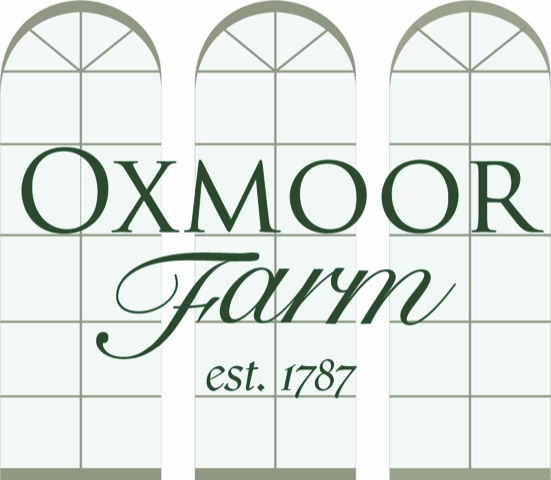
About Oxmoor Farm
Home and land of 6 generations of Kentuckians, starting with Revolutionary War hero William Christian, and his wife, Annie Henry, sister of Patrick Henry.
Nestled 8 miles outside of Downtown Louisville, Oxmoor is an historical gem giving us a glimpse into Kentucky’s past.
Locust Grove - Where Louisville Begins
561 blankenbaker lane, louisville, ky 40207, tuesday - saturday 10:00am to 4:30pm, locust grove reopens for tours in march 2024.
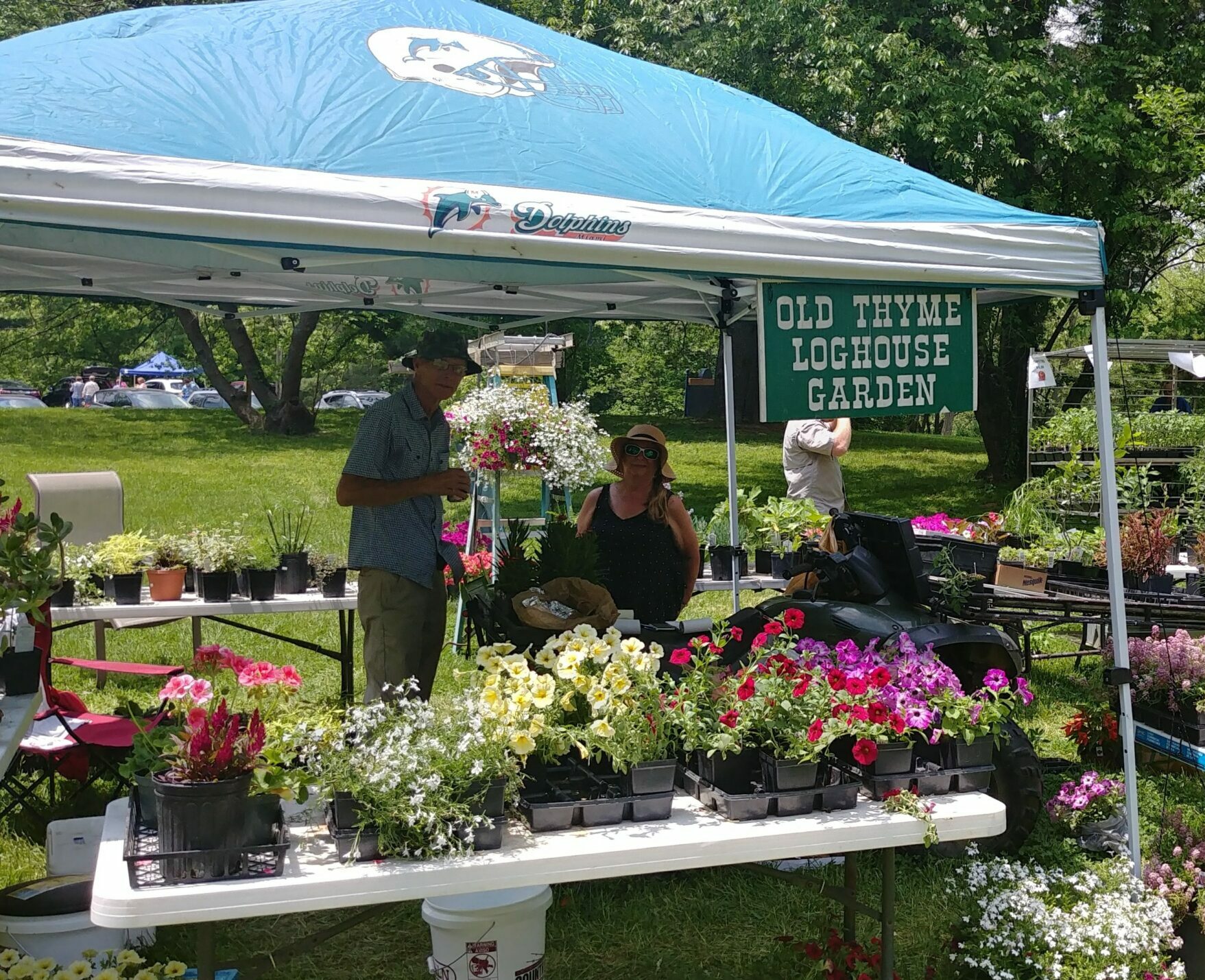
Gardeners’ Fair 2024
Discover a botanical wonderland at the 2024 Gardeners Fair hosted by Locust Grove. Immerse yourself in a vibrant tapestry of blossoming beauty and verdant foliage. Witness captivating demonstrations showcasing farm animals, gardening techniques, conservation efforts, and more. Beyond an event, the Gardeners' Fair celebrates nature's wonders and the passion of those who nurture it. Join us for a weekend of growth, inspiration, and the pure joy of all things botanical.
Admission: $10/Adults | $5/Children 6-12 | Free/Children under 6
To learn more about the event or to become a vendor or sponsor click "Learn More" .
Saturday - Sunday, May 11 - 12, 10:00am - 4:30pm
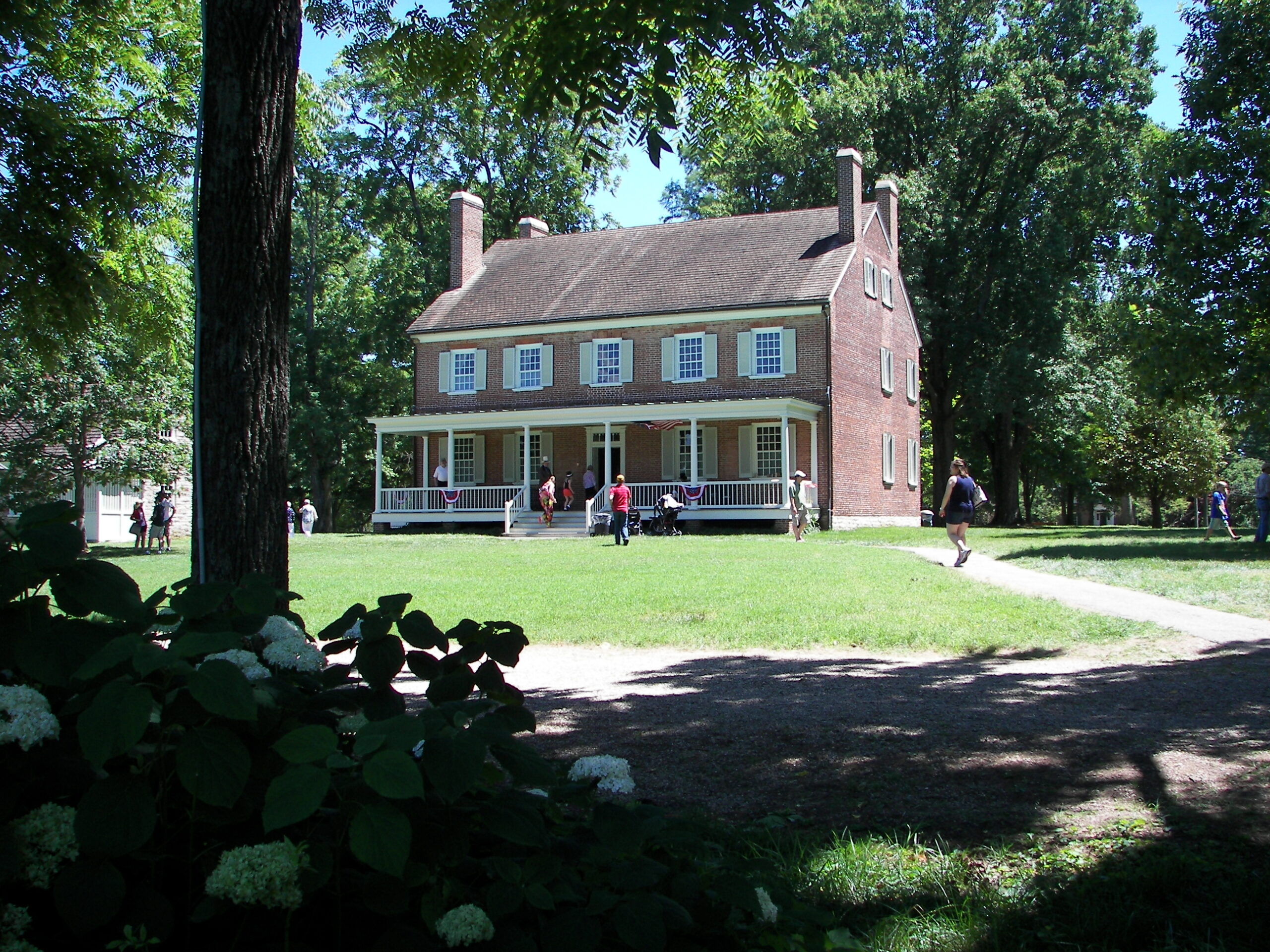
Open for Tours!
We are thrilled to announce that Locust Grove has officially reopened its doors for tours following a temporary closure to upgrade our HVAC system over the winter. Our team is excited to welcome visitors back to experience Locust Grove at our regular tour times-- 10:30am, 12 noon, 1:30pm, and 3:30 pm, Tuesday through Saturday.
If things appear a bit unusual on our website, fear not! We're currently in the process of undergoing a complete makeover to give Locust Grove a fresh look. This spring, we're excited to unveil our brand new website, which will offer enhanced navigability, deeper historical insights, and seamless access to our exciting array of programs and events. Stay tuned!
You can always contact us at (502) 897 - 9845 with any questions.
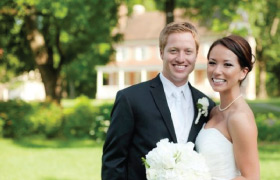
Rent Locust Grove
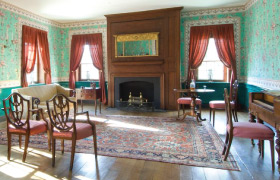
Tour the House
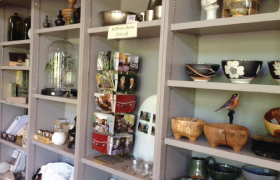
Browse the Store
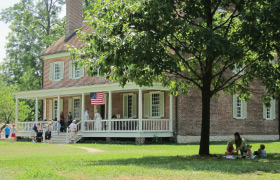
Make a Donation
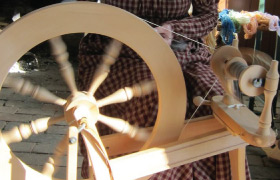
Book a Field Trip
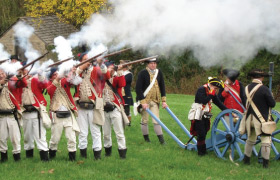
View Our Events
Upcoming events, yoga at locust grove, tuesday, 6:30pm - 7:30pm.
Welcome in Spring with Sunset Yoga event on April 16th. Surrounded by the soothing sounds of nature, join us for a rejuvenating yoga experience that welcomes Spring. Unwind and stretch in a serene setting, guided by experienced instructors from Studio Hustle. Whether you're a seasoned yogi or just beginning your journey, this session promises peace and balance. Experience the refreshing ambiance of spring, connect with your breathing, and let the tranquility sweep away the stress of the outside world. Don't miss this opportunity for a tranquil escape amidst the natural beauty of Locust Grove. This donation-based class is in partnership with local business Studio Hustle. Click "Attend" to sign up!
A Midsummer’s Nights Dream Performed by Kentucky Shakespeare
Thursday, 6:30pm - 8:00pm.
Schedule: Doors open at 6:00 p.m. | Performance begins at 6:30 p.m. Lose yourself in the enchanting world of Shakespeare's "A Midsummer Night's Dream" as performed by the mesmerizing talents of Kentucky Shakespeare. Enjoy this free performance underneath the stars at Locust Grove. Join us on April 18 for a magical evening filled with love, mischief, and the whimsy of the fairy kingdom. An unforgettable night of classical theatre awaits!
2024 Gardeners’ Fair
Saturday - sunday, 10:00am - 4:30pm.
Admission: $10/Adults | $5/Children under 18 | Free/Children under 6 Discover a botanical wonderland at the 2024 Gardeners Fair hosted by Locust Grove. Immerse yourself in a vibrant tapestry of blossoming beauty and verdant foliage. Witness captivating demonstrations showcasing farm animals, gardening techniques, conservation efforts, and more. Beyond an event, the Gardeners' Fair celebrates nature's wonders and the passion of those who nurture it. Join us for a weekend of growth, inspiration, and the pure joy of all things botanical. To learn more about the event or to become a vendor or sponsor click "Learn More" .
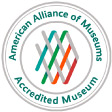
Locust Grove is a National Historic Landmark owned by Louisville Metro Government and operated by Historic Locust Grove, Inc.
- Make a Gift
- How You Can Help
TRF Sanctuary Farm at Chestnut Hall
Click to purchase your tickets to the holiday showhouse, trf sanctuary farm at chestnut hall (prospect, ky), year established: 2021, acreage: 25, capacity: 10, about the farm.
Established in April 2021, the TRF Sanctuary Farm at Chestnut Hall has been created with the specific intention of introducing the Louisville community, neighbors from across the Commonwealth of Kentucky and visitors around the world to the beauty and magic of Thoroughbred horses.
Home to 10 retired Thoroughbred racehorses, Chestnut Halls sits on 25 picturesque acres. The horses at Chestnut Hall vary in their racing stats, some horses may have never won a race and few who have great race records. All the horses, who call Chestnut Hall home, will enjoy a lifetime of safety and sanctuary with the Thoroughbred Retirement Foundation.
The horses have served as ambassadors for Thoroughbred aftercare to educate racing fans and the community at large about these equine athletes and the importance of providing a “soft landing” for each of them. Throughout the year, the TRF welcomes visitors to Chestnut Hall for tours and special events to meet the horses, learn about the lives of a Thoroughbred racehorse, and the many gifts they bring to the communities where they live.
Important Note: The TRF Sanctuary Farm at Chestnut Hall is not open to the public. Visitors are welcome by private appointment only.
To book a tour through horse country, please click the link:, visit horse country., note: we are unable to cancel, reschedule, or refund tours booked through our 3rd party affiliate or outside companies. please contact them with any questions regarding your tour or upcoming tours. we are sorry if this creates any inconvenience, thank you for the understanding.
- April 6: TRF Press Release “ Thoroughbred Retirement Foundation Opens New Sanctuary Farm near Louisville, KY”
Thank you to our wonderful photographers in our gallery photos- Charles Toler, Kathy Davis, Molly B. Photography, Kyle Shepard, Anthony Seitz, and Linda Doane
Holiday Showhouse Tickets

IMAGES
VIDEO
COMMENTS
Bus Tours. Tourist Attractions. River Boat Tours. Tour Guides. Top 10 Best Plantation Tours in Louisville, KY - April 2024 - Yelp - Farmington Historic Plantation, Slave Trading in Louisville Historical Marker, Riverside, the Farnsley-Moremen Landing, Cherokee Park, Angel's Envy, Plantation Swim & Tennis Club, Pandora Productions.
Completed in 1816, Farmington was the center of a 550 acre hemp plantation owned by the Speed family and sustained by nearly 60 slaves. The site explores the history of the family, the enslaved population, and the family's strong friendship with Abraham Lincoln.Tour the new Lincoln exhibits, the many outbuildings, and the recently restored historic home.
GENERAL TOUR. Nestled 8 miles outside Louisville, Oxmoor is a historical gem giving us a glimpse into Kentucky's past. ... as well as a kitchen wing and a grand library wing transforming the house from a southern plantation farmhouse to a Gilded-Age Era estate. Oxmoor is furnished with unique and priceless antiques and artwork that was ...
Farmington Historic Plantation was home to the John and Lucy Fry Speed family and over 70 enslaved black Americans. The main house, completed in 1816, is a Jeffersonian Federal style Italianate villa, the center of a 550-acre hemp plantation. The house, restored 2000-2002, includes period furniture, art, and textiles.
Address: 3033 Bardstown Road (map) Louisville, KY 40205. Phone: (502) 452-9920. Farmington official web site!
The former hemp plantation and main house, completed in 1816, is located on 18 acres in the heart of Jefferson County. Farmington provides the community with a fun, family-friendly environment to learn about Louisville's rich history and life on a 19th century farm through preservation, education, and exhibits. Web Design by Ashton Advertising.
Take a Tour of Farmington. ... Louisville, Kentucky United States. 502-452-9920 EMAIL FARMINGTON. TOUR TIMES. ... Farmington is owned by Historic Homes Foundation, a 501(c)(3) nonprofit. The former hemp plantation and main house, completed in 1816, is located on 18 acres in the heart of Jefferson County. Farmington provides the community with a ...
Specialties: Louisville's first historic house museum interprets the lives of the John Speed family and the over 60 enslaved black Americans that farmed the 550-acre hemp plantation visited by Abraham Lincoln in 1841. Established in 1957. Farmington Historic Plantation, Louisville's first historic house museum, opened in 1959.
Owner: Historic Homes Foundation/Farmington Historic Plantation. Home: This is a 4-chamber, 6,000-square-foot, Jeffersonian Federal home that was built in 1816 in Louisville off Bardstown Road ...
Tour the new Lincoln exhibits, the many outbuildings, and recently restored historic home. Farmington is open for guided tours of the historic mansion. 3033 Bardstown Rd. Louisville, KY 40280. 502-452-9920. Guided Tours begin on the hour at the Visitor Center. Self-Guided Tours of the historic 18 acre grounds are available daily 9am-6.
Farmington Historic Plantation Highlands. 3033 Bardstown Rd. Louisville, KY 40205
On April 28, 1959, Farmington Historic Home opened as the first house museum in Jefferson County and quickly became one of the most visited historic sites in the Commonwealth. HHF founders knew Farmington had been a thriving hemp plantation carved out of the Kentucky wilderness. It was home to John and Lucy Gilmer Fry Speed's family.
Farmington Historic Plantation was home to the John and Lucy Fry Speed family and over 70 enslaved black Americans. The main house, completed in 1816, is a Jeffersonian Federal style Italianate villa, the center of a 550-acre hemp plantation. The house, restored 2000-2002, includes period furniture, art, and textiles.
Historical Marker #2231 in Louisville denotes Farmington Historic Plantation, a fourteen-room Federal-style home built by John and Lucy Speed in 1816. The house was designed from plans drawn by Thomas Jefferson. For much of its existence, Farmington was 550-acre hemp plantation with a large slave population. Abraham Lincoln, a close friend of John Speed's son, Joshua, spent about three ...
Explore the 200 year old mansion and plantation of the Rowan family. Stories of deadly duels, horse racing, fortune, fame, demise, all alongside original fine antiques, & significant architectural spaces. Our talented tour guides perform the song for which the house is named, "My Old Kentucky Home," on every tour. No reservations needed.
A collection of Louisville's architectural and cultural heritage treasures, to inform and educate anyone wanting to appreciate our surviving built history. ... West Main Street offers a walking tour opportunity featuring some of the best of Louisville's architectural heritage. ... Farmington is a 19th century home and former hemp plantation ...
Farmington Historic Plantation: Plantation Tours - See 120 traveler reviews, 38 candid photos, and great deals for Louisville, KY, at Tripadvisor.
Conrad Caldwell House. 1402 St. James Court, Louisville; conrad-caldwell.org ; 502-636-5023. Tours: Wednesday, Friday, Saturday and Sunday at noon, 1, 2 and 3 p.m. Wednesday tours are self-guided ...
Nestled 8 miles outside of Downtown Louisville, Oxmoor is an historical gem giving us a glimpse into Kentucky's past. We wish to acknowledge that this area of Kentucky, including the Oxmoor Farm property, was at one time occupied by the indigenous people that lived in the Ohio Valley region, namely the Iroquois, Shawnee, and Osage tribes.
561 Blankenbaker Lane, Louisville, KY 40207 Tuesday - Saturday 10:00am to 4:30pm. Locust Grove reopens for tours in March 2024. Purchase Tickets. Visitor Information. ... Our team is excited to welcome visitors back to experience Locust Grove at our regular tour times-- 10:30am, 12 noon, 1:30pm, and 3:30 pm, Tuesday through Saturday. ...
Established in April 2021, the TRF Sanctuary Farm at Chestnut Hall has been created with the specific intention of introducing the Louisville community, neighbors from across the Commonwealth of Kentucky and visitors around the world to the importance of Thoroughbred aftercare. This beautiful 25 acre farm in Prospect, KY will serve as the "forever home" for 10 retired Thoroughbred racehorses ...